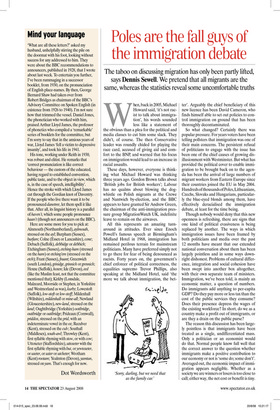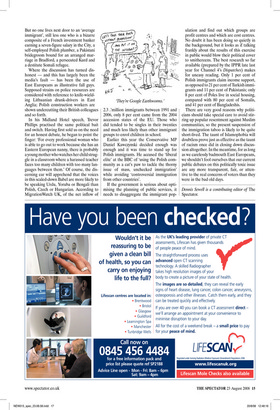Poles are the fall guys of the immigration debate
The taboo on discussing migration has only been partly lifted, says Dennis Sewell. We pretend that all migrants are the same, whereas the statistics reveal some uncomfortable truths When, back in 2005, Michael Howard said, ‘it’s not racist to talk about immigration’, his words sounded less like a statement of the obvious than a plea for the political and media classes to cut him some slack. They didn’t, of course. The then Conservative leader was roundly chided for playing the race card, accused of giving aid and comfort to the BNP, and warned that his focus on immigration would lead to an increase in racial assaults.
These days, however, everyone is thinking what Michael Howard was thinking three years ago. Gordon Brown talks about ‘British jobs for British workers’; Labour has no qualms about blowing the dogwhistle on Polish migrants at the Crewe and Nantwich by-election, and the BBC appears to have granted Sir Andrew Green, the chairman of the anti-immigration pressure group MigrationWatch UK, indefinite leave to remain on the airwaves.
All this represents an amazing turnaround in attitudes. Ever since Enoch Powell’s famous speech at Birmingham’s Midland Hotel in 1968, immigration has remained perilous terrain for mainstream politicians. Many have preferred simply not to go there for fear of being denounced as racists. Forty years on, the government’s chief enforcer of political correctness, the equalities supremo Trevor Phillips, also speaking at the Midland Hotel, said ‘the more we talk about immigration, the bet ter’. Arguably the chief beneficiary of this new licence has been David Cameron, who finds himself able to set out policies to control immigration on ground that has been thoroughly decontaminated.
So what changed? Certainly there was popular pressure. For years voters have been telling pollsters that immigration was one of their main concerns. The persistent refusal of politicians to engage with the issue has been one of the chief causes of growing disillusionment with Westminster. But what has provided the political cover to enable immigration to be brought back on to the agenda has been the arrival of large numbers of migrant workers from Eastern Europe since their countries joined the EU in May 2004. Hundreds of thousands of Poles, Lithuanians, Czechs, Slovaks and Hungarians, particularly the blue-eyed blonds among them, have effectively deracialised the immigration debate, at least for the time being.
Though nobody would deny that this new openness is refreshing, there are signs that one kind of political evasiveness is being replaced by another. The ways in which immigration issues have been framed by both politicians and media over the past 12 months have meant that our extended national conversation about them has been largely pointless and in some ways downright dishonest. Problems of cultural difference, integration and social cohesion have been swept into another box altogether, with their own separate team of ministers. Immigration, we’ve been told, is mainly an economic matter, a question of numbers. Do immigrants add anything to per-capita GDP? Do they pay more or less tax than the cost of the public services they consume? Does their presence depress the wages of the existing workforce? In short, do we as a country make a profit out of immigrants, or are they a drain on the public purse?
The reason this discussion has been largely pointless is that immigrants have been treated as a single, undifferentiated mass. Only a politician or an economist would do that. Normal people know full well that the correct answer to the question whether immigrants make a positive contribution to our economy or not is ‘some do; some don’t’. Averaged out, the economic impact of immigration appears negligible. Whether as a society we are winners or losers is too close to call; either way, the net cost or benefit is tiny. But no one lives next door to an ‘average immigrant’, still less one who is a bizarre composite of a French investment banker earning a seven-figure salary in the City, a self-employed Polish plumber, a Pakistani bridegroom bound for an arranged marriage in Bradford, a persecuted Kurd and a destitute Somali refugee.
Where the discussion has turned dishonest — and this has largely been the media’s fault — has been the use of East Europeans as illustrative fall guys. Supposed strains on police resources are considered with reference to knife-wielding Lithuanian drunk-drivers in East Anglia; Polish construction workers are shown undercutting their British colleagues and so forth.
In his Midland Hotel speech, Trevor Phillips practised the same political bait and switch. Having first sold us on the need for an honest debate, he began to point the finger: ‘For every professional woman who is able to go out to work because she has an Eastern European nanny, there is probably a young mother who watches her child struggle in a classroom where a harassed teacher faces too many children with too many languages between them.’ Of course, the discerning ear will apprehend that the voices in this scaled-down Babel are more likely to be speaking Urdu, Yoruba or Bengali than Polish, Czech or Hungarian. According to MigrationWatch UK, of the net inflow of 2.3 .’million immigrants between 1991 and 2006, only 8 per cent came from the 2004 accession states of the EU. Those who did tended to be singles in their twenties and much less likely than other immigrant groups to enrol children in school.
Earlier this year the Conservative MP Daniel Kawczynski decided enough was enough and it was time to stand up for Polish immigrants. He accused the ‘liberal elite’ at the BBC of ‘using the Polish community as a cat’s paw to tackle the thorny issue of mass, unchecked immigration’ while avoiding ‘controversial immigration from other countries’.
If the government is serious about optimising the planning of public services, it needs to disaggregate the immigrant pop ulation and find out which groups are profit centres and which are cost centres. No doubt it has been doing so quietly in the background, but it looks as if talking frankly about the results of this exercise in public would blow their political cover to smithereens. The best research so far available (prepared by the IPPR late last year for Channel 4’s Dispatches) makes for uneasy reading. Only 1 per cent of Polish immigrants claim income support, as opposed to 21 per cent of Turkish immigrants and 11 per cent of Pakistanis; only 8 per cent of Poles live in social housing, compared with 80 per cent of Somalis, and 41 per cent of Bangladeshis.
There are very good reasons why politicians should take special care to avoid stirring up popular resentment against Muslim communities, so the present suspension of the immigration taboo is likely to be quite short-lived. The taunt of Islamophobia will doubtless prove just as effective as the taunt of racism once did in closing down discussion altogether. In the meantime, for as long as we carelessly badmouth East Europeans, we shouldn’t fool ourselves that our current public debates on this politically toxic issue are any more transparent, fair, or attentive to the real concerns of voters than they were in the bad old days.



























































 Previous page
Previous page